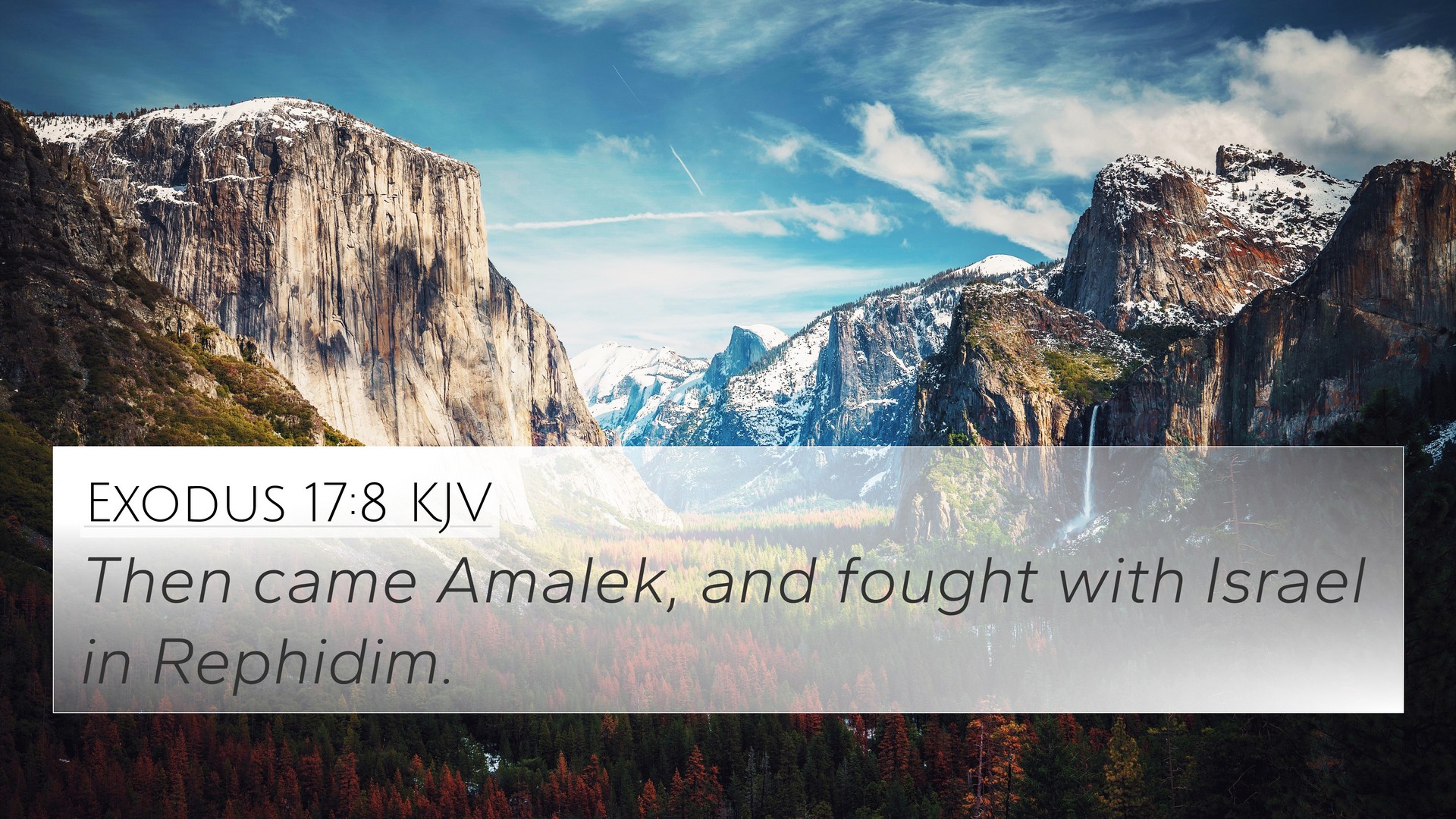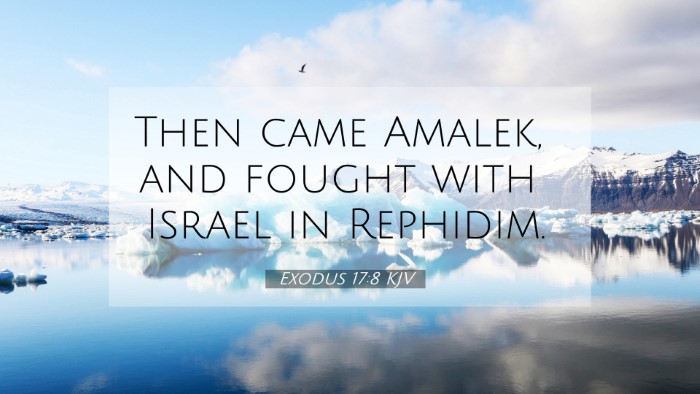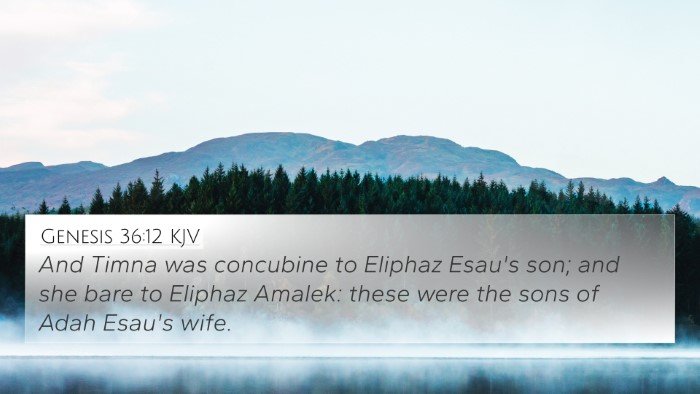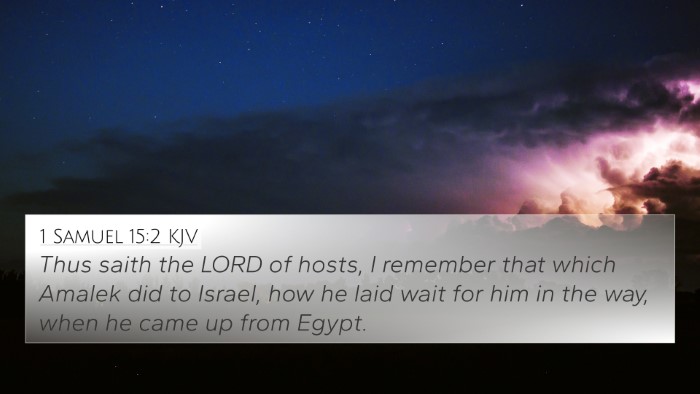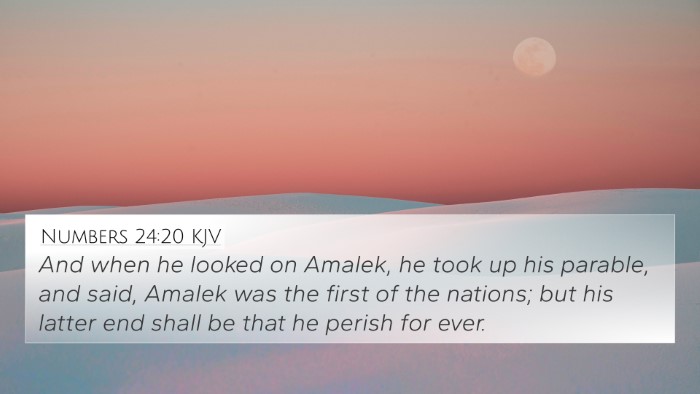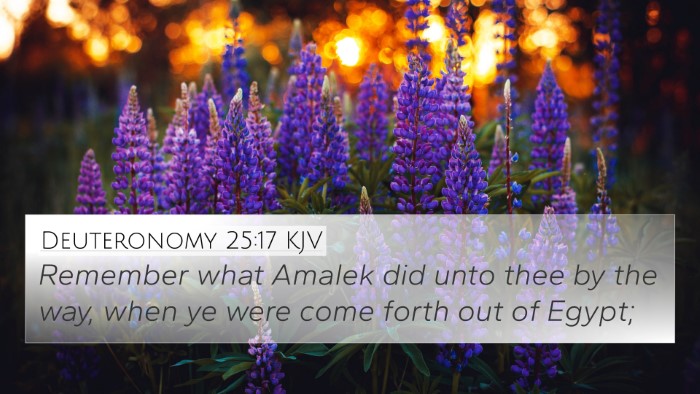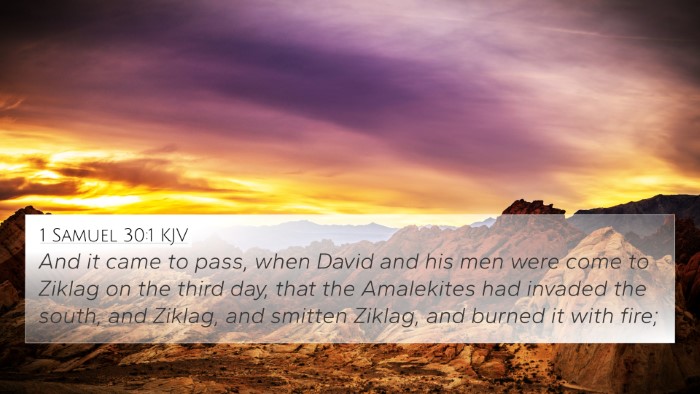Understanding Exodus 17:8
In Exodus 17:8, we find the Israelites facing the Amalekites in battle. This verse is pivotal as it begins the account of Israel's first recorded battle after the Exodus. The verse reads:
“Then came Amalek, and fought with Israel in Rephidim.” (Exodus 17:8, KJV)
This confrontation marks a significant moment in the history of Israel, emphasizing their struggles and divine support. Below, we draw upon insights from notable public domain commentaries by Matthew Henry, Albert Barnes, and Adam Clarke to gain a deeper understanding of this verse.
Summary of Insights from Commentaries
Matthew Henry's Commentary
Matthew Henry observes that the attack from Amalek was unprovoked and so ignoble as to warrant divine retribution. He highlights the spiritual significance of this battle, indicating that it represents the continued struggle against sin and the enemies of the faithful. Henry connects the physical battle to spiritual warfare, reinforcing the theme that God fights for His people.
Albert Barnes' Notes
Albert Barnes emphasizes the historical context of this conflict, noting that Amalek was the first nation to attack Israel after their deliverance from Egypt. He discusses the tactics of the Amalekites and the significance of God's intervention, illustrating that Israel's victory is dependent on their reliance on divine assistance. Barnes also stresses the importance of remembering this battle as a lesson on the nature of human conflict and the presence of God in it.
Adam Clarke's Commentary
Adam Clarke elaborates on the anthropological perspectives of the Amalekites and the Israelite's journey. He provides insights into how this skirmish foreshadows future conflicts and the necessity for Israel to maintain their faith and reliance on Yahweh. Clarke draws connections between this event and the theological implications in the entire narrative of Israel’s journey toward the Promised Land.
Bible Verses Related to Exodus 17:8
Understanding Exodus 17:8 is enriched through its connections with other scriptures. Below are cross-references that enhance our understanding of this verse:
- Deuteronomy 25:17-19: Highlights God's command to remember the actions of the Amalekites against Israel.
- 1 Samuel 15:2-3: The repeated divine judgment against Amalek demonstrates the seriousness of their attack.
- Hebrews 12:1: Relates to the call for God’s people to persevere in spiritual struggles.
- 2 Corinthians 10:3-5: Discusses the spiritual warfare metaphor relevant to believers today.
- Romans 8:31: Affirms that if God is for us, who can be against us, paralleling Israel’s reliance on God’s support.
- Exodus 14:14: Reminds believers of God’s promise to fight our battles.
- Psalm 60:12: Demonstrates reliance on God for victory over enemies.
- Psalm 68:1: Calls for God to arise and scatter His enemies, relating to the victory seen in Exodus 17:8.
- James 4:7: Encourages believers to resist the devil, drawing parallels with the Israelites’ resistance against Amalek.
- Revelation 12:11: Describes how believers overcome through the blood of the Lamb, echoing the victory theme in Exodus 17.
Thematic Connections and Biblical Cross-Referencing
The thematic connections between Exodus 17:8 and other scriptures reinforce the ongoing narrative of struggle and divine intervention. These cross-references serve as tools for deeper Bible study, showing how God’s people have consistently faced adversaries while depending on His strength. Through comparative Bible verse analysis, we see that just as Israel faced physical foes, believers today confront spiritual challenges.
Tools for Bible Cross-Referencing
Utilizing tools like a Bible concordance or a cross-reference Bible study guide can help individuals uncover these connections between verses. By understanding the thematic Bible verse connections, readers can better appreciate the continuity of scripture and its application to both historical and contemporary issues.
Inter-Biblical Dialogue
The events in Exodus 17 initiate an inter-Biblical dialogue that echoes through later texts, establishing a framework for understanding God's justice, mercy, and the expectation of His people. By recognizing how the Old Testament anticipates New Testament teaching, believers can deepen their faith through nuanced scriptural understanding and the application of these truths in daily life.
Conclusion
In conclusion, Exodus 17:8 is much more than a historical account of a battle; it encapsulates profound theological truths about reliance on God amid adversity. The insights drawn from the public domain commentaries, coupled with cross-references, provide a comprehensive understanding of this pivotal verse. Through diligent study, believers can discover how interconnected the scriptures are and how these teachings continue to resonate today.
